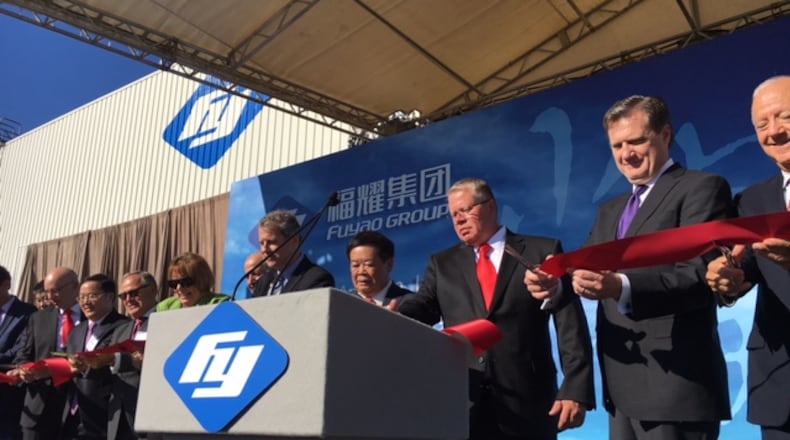At one point in the film, that executive, Dave Burrows, said: “I’m going to have to kill a senator. I’m going to take these big scissors and cut off Sen. Brown’s head.”
In an interview Friday, Brown admitted that was a new experience for him.
“You’re a little startled,” the senator said. “I mean, I didn’t see it coming. I knew I was in the movie in some places. But it wasn’t described to me. Of course, it’s startling.”
He added, “I can fend for myself.”
Brown — who said he watched the film recently with his wife Connie — said he understands that people get angry at politicians. But he added: “I’ve heard people say things like that, but not on screen. Not in a movie theater.”
As shown in “American Factory,” at Fuyao’s October 2016 opening gala in Moraine, Brown from a podium called on Fuyao leaders to let the unionization effort go forward, if that was what workers desired. (More than a year later, workers rejected the creation of a United Auto Workers bargaining unit at the plant.)
RELATED: 'American Factory': Fuyao CEO disputes translation in Netflix film
Chinese and American managers reacted to Brown’s speech with marked displeasure.
“Who the (expletive deleted) does he think he is,” Burrows, then a Fuyao vice president, said on camera after Brown’s speech.
“That is not beneficial to us,” a Chinese executive later tells Burrows at a University of Dayton reception, also on camera, referring to Brown’s speech.
“I’m going to have to kill a senator,” Burrows said moments later, again with a camera operator following him and recording what he said. “I’m going to take these big scissors and cut off Sen. Brown’s head.”
Burrows added: “He (Brown) didn’t tell us he was going to do that. He did that on purpose, so they’re cut off. They’ll never be allowed in the plant again.”
Burrows today is vice president of business services at Goodwill Easter Seals Miami Valley. In a management shakeup, he and former plant leader John Gauthier left their positions at Fuyao about a month after the plant’s public opening. Jeff Liu today is Fuyao Glass America’s chief executive.
In May 2017, Burrows filed suit against Fuyao and company founder and Chairman Cho Tak Wong, alleging breach of contract, defamation and other charges tied to his separation from the Chinese-owned company. (Gauthier is not part of Burrow’s lawsuit. According to his LinkedIn page, Gauthier is manufacturing operations lead at Corning Automotive Glass.)
BREAKING: @fuyaousa fined for firing workers, newly revealed @NLRB records show https://t.co/XWlWSVxwVE
— Thomas Gnau (@ThomasGnau) August 27, 2019
Julia Reichert and Steve Bognar, the Yellow Springs-based producers and directors of “American Factory,” said Burrows saw the film before it began streaming on Netflix Aug. 21. They said Burrows called Brown’s office to apologize for remarks captured in the film.
Asked if he accepted the apology, Brown said: “Yeah, sure, I don’t care (about) what he said. What I care about is what their treatment of workers (is). What he said is just an indication of an anti-worker attitude by the Chinese and American management at that company.”
Burrows declined to comment, citing his ongoing lawsuit.
“We do not comment on an individual former employee’s personal remarks,” Liu said in an email Friday. “We have high respect to Sen. Sherrod Brown.
Added Liu: “Our workers are our biggest assets, and we are committed to them and to the Dayton community. We will continue to focus on delivering high-quality products, supporting workers’ career development, and making more contributions to the local communities.”
Kristin Dziczek, vice president of industry, labor and economics at the Center for Automotive Research, said Burrows’ remarks show an “unguarded moment.”
“You can’t do that with a U.S. senator,” she said.
Dziczek said moments like that in “American Factory” reflect a level of access for the filmmakers that she called “incredible.”
It also speaks to the “trust” the filmmakers had with those being filmed, she added.
“The trust that these people have is having them become fixtures in the environment,” Dziczek said. “They’re not really there. And so you have these unguarded moments, like threatening to keep a senator out of a plant.”
Laura Luehrmann, a Wright State professor of political science, said the episode is one of several “extraordinary moments” in “American Factory.”
“I wonder whether he (Burrows) wishes now he could take back some of those comments,” Luehrmann said. “By the end of the documentary, the same individual states that he had changed his mind about the workers needing protection.
“Part of it shows the pressure the executives at the new plant were under,” Luehrmann added.
Brown said he has not been back to the Moraine plant since October 2016.
“I did not know I was banned from the plant until I saw that,” he said, adding moments later: “I assume I could get back in the plant if I asked, but maybe not.”
Liu said he has invited Brown to return to the plant.
About the Author

